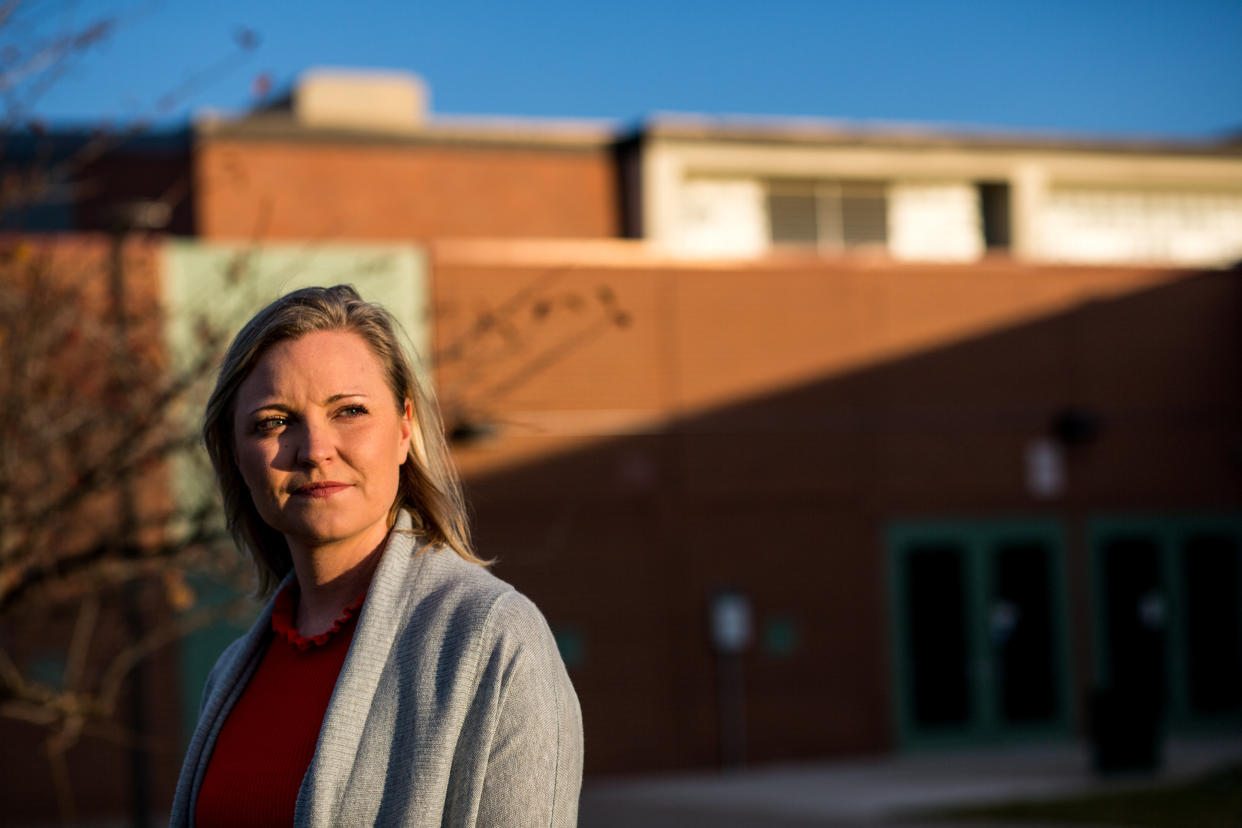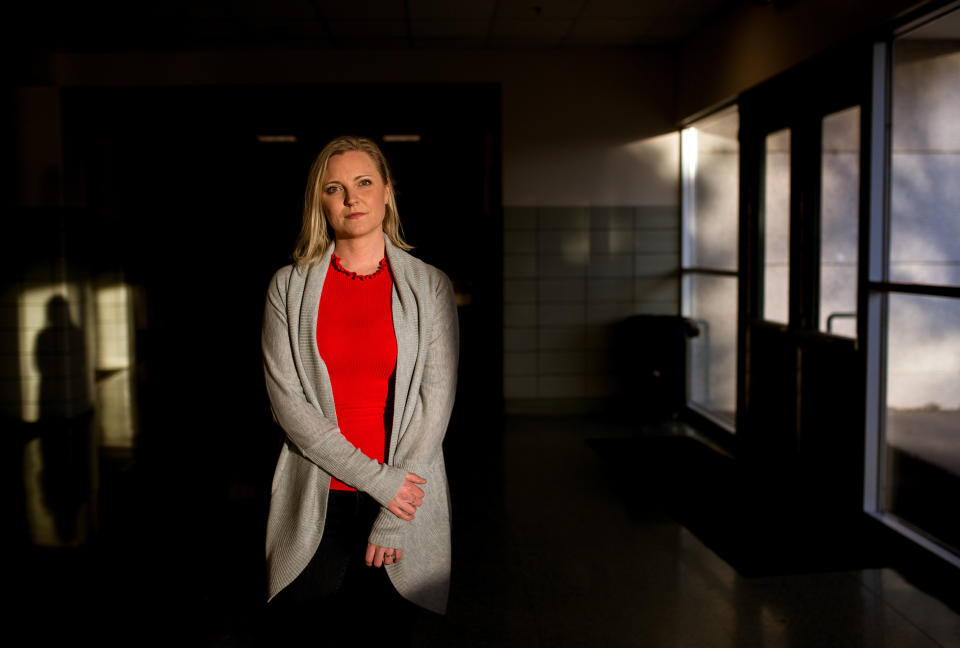"If you're surrounded by people who understand, then you don't have to explain yourself."

Heather Martin, 36, Aurora, Colorado. Columbine High School, April 20, 1999.
Heather Martin spent hours trapped in a small choir office with about 60 classmates during the Columbine High School shooting. She never saw the killers, but she did hear gunshots. She remembers crying, knowing that people were probably dying somewhere on campus. As the students hid, they took turns using a telephone in the office to call their parents.
In the immediate aftermath, I really just hung around with my group of friends from that day, and specifically people who were in the room with me [during the shooting]. I was lucky in that my parents’ house was kind of the place to hang out, so it was like the hub. Everybody just came and we sat in the basement and we would read newspaper articles, and we would get mad at the media for getting things wrong.
Going off to college and sitting in a classroom surrounded by strangers was really difficult. That’s when I started to finally learn the subconscious triggers that I had. For example, I was sitting in class and they did a fire drill. The fire alarm went off. I don’t remember the fire alarm going off the whole time when I was trapped in the [Columbine high] school, but apparently it was.
So I was sitting in this class surrounded by strangers, and I just started crying. I got up and couldn’t figure out why I was crying. I was so confused. Why am I crying? What is happening to me?
I was sort of a pariah. People were looking at me, wondering “Why is this crazy girl crying?” My roommate went back in to tell my professor that I wouldn’t be back to class.
She was like, “OK, well, I’ll just mark her absent.” I was just confronted with people who had no idea. Almost nobody can have any idea, but any amount of sympathy, of empathy, was not there. And it had only been two and a half months.
Then one month, I started to feel like, “Why am I not over this yet? Why am I still crying about this?” I thought, “I’m fine, and I don’t know why I’m still feeling whatever I’m feeling” ― the trouble sleeping, the nightmares, the “what if,” the survivor’s guilt.
I dealt with that for about a year, and at the end of the year exactly, I started to notice that something was not right with me. I had dropped out of school at this point ― I just stopped going ― and I started using recreational drugs.
Luckily for me it was nothing that was addictive, but I just knew that that wasn’t me. Education had always been very important to me. Something wasn’t right. I’d smoked pot a couple of times, but nothing else. So I talked to my parents and said that I thought that I should go see a therapist.
At this point, I think there was still funding to do that, but we were lucky in that my parents knew someone and they just paid for it. I went to four or five sessions with a woman named Mary, and really what I got out of the sessions was her telling me, “Yes, you are feeling this way because you were traumatized in a major way.”
I said, “Are you sure?” She said, “Yes, you should feel traumatized, and you are.” After I got that validated, I stopped going. I didn’t go back to school, and I ended up going into the restaurant business and stayed with the same company for 13 years.
After Columbine, I avoided the news completely. For example, I didn’t hear about 9/11 until I was driving to work and it was all over the radio. So that sent me into a series of flashbacks, and I ended up, somehow, miraculously, making it safely into work.
When I came to, I was crouched behind the ice machine. They put a bag over my face because I was hyperventilating. And that was the first of many really debilitating anxiety attacks.
It took them a lot of years to diagnose my anxiety attacks ― that they were actually anxiety attacks ― I think for a couple reasons.

First off, I had stopped telling people that I was at Columbine, because time’s passing so it shouldn’t matter. This hasn’t happened in like six or seven years, but the cycle was, I’ll get triggered by something ― it used to be claustrophobic, like really tight rooms and heat, because I’m trapped in that room and it was so hot in there ― and I could feel an anxiety attack coming on.
Typically with anxiety attacks, it’s chest pain or your arm goes numb or whatever, and people think it’s a heart attack. My symptoms were really different. When I got it, they felt like cramps. As I’m going through this anxiety attack, I’m telling people that I’m dying and they have to call an ambulance. The ambulance comes out and I’m like, “Oh my gosh, my cramps!” They’re like, “Oh, you’re having a miscarriage.”
They’re trying to diagnose that kind of pain, but after three trips to the ER they finally were like, “I think this is just [an] anxiety attack, because as soon as we give you a Xanax at the hospital, you calm down and you’re good.”
At the 10-year anniversary of the Columbine shooting, Mr. [Frank] DeAngelis ― he was the principal ― invited the class of ’99 back to the school for the anniversary. We graduated, so we [had] never had to go back into the school. So being invited back was a huge milestone for me. We went back into the school. It was more like a happy reunion to see everyone than scared or anxious.
Then after 13 years was 2012, and that’s when the Aurora theater shooting happened. Essentially as a survivor, whenever another mass shooting happens, there’s a whole multitude of feelings, and you kind of run through the gamut. But the one that kind of threaded through all of them is this sense of helplessness.
I needed to do something to help, because I knew what this community is in for. I knew what’s coming, and it’s awful, so I wanted to do something to help.
After the Aurora theater shooting, my friend Jen texted me and she just said, “Hey, what do you think about doing a support group for the Aurora people?”
I was like, “Dude, I’m in!” So we formed The Rebels Project.
We basically realized that one thing that we were missing throughout all those years was somebody to talk to that wouldn’t judge you and wouldn’t make you feel bad for what you were feeling, or feel wrong, like something that you were going through was wrong somehow. We figured that we could provide that to a new community that was in just the early stages.
After a little bit, we reached out to Newtown. Then I visited Virginia Tech. Now The Rebels Project is basically an online private group. Every year we fly survivors out from around the country to be together for a weekend. As one survivor from the Paducah, Kentucky, high school shooting says, that’s her weekend to feel normal.
If you’re surrounded by people who understand, then you don’t have to explain yourself. You don’t have to explain why the grocery store makes you nervous. You don’t have to explain why you give balloons the stink eye.
For me and many of the people that I know, I will be recovering for the rest of my life. There’s gonna be good days and bad days. We recently had a red lockdown at my school. A student was shot outside. I’m herding my kids into the computer labs and we’re hiding under desks, and I’m super calm and I got to remain calm.
And then afterwards it was, “Oh sorry, this was supposed to be an orange lockdown and whatnot.” But that whole week was rough for me. Again, that was a big, big dip in my recovery. I can say I’ve definitely been on high alert ever since then. And then Vegas. And then I went down to Orlando and I spoke on a panel for mental health professionals that are helping the Pulse nightclub survivors and I met some of the Pulse nightclub’s survivors.

And that’s one of the things that we’re able to offer. Everybody has those experiences, but we have the time. It’ll be 19 years for us in April. For Sherrie it’s been four years. For Chelsea it’s been five years. They can ask, where were you at, at five years? Personally, I was nowhere near where they’re at in their recovery. I was still avoiding it and not talking about it and trying to move on with my life.
As told to Anna Almendrala. This interview has been condensed and edited for clarity.
Love HuffPost? Become a founding member of HuffPost Plus today.
This article originally appeared on HuffPost.

